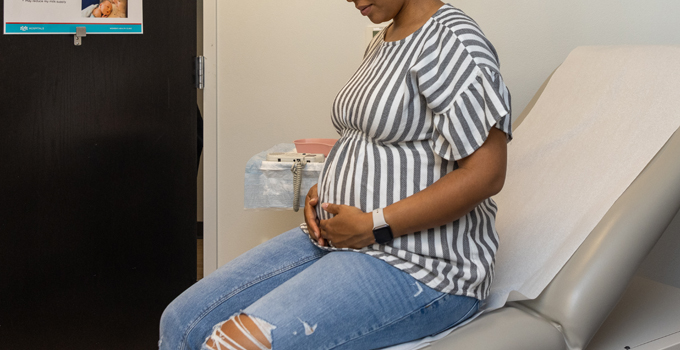Does it hurt in your pelvis when you pee? Feel like you have to go all the time? Is your urine a funny color? If so, you might have a urinary tract infection (UTI). Pregnant women are at an increased risk for these bacterial infections that can start anywhere in the urinary tract—the urethra, bladder and kidneys.
As the uterus gets bigger in pregnancy, it pushes on the bladder. That can block urine from draining easily from the bladder, causing a UTI. Hormones changes can also cause a UTI.
UTIs are the most common complication during pregnancy. About 1 in 10 pregnant patients get one, often during the first and second trimester.
It is important to get treated for a UTI. With good care, a UTI won’t harm you or your baby. But without treatment it can cause a kidney infection and lead to long-term health problems such as:
- High blood pressure
- Kidney damage or scarring
- Low birth weight
- Preterm labor
- Sepsis, an infection of the blood
Symptoms to Watch Out For
One of the earliest and most common symptoms of a UTI is a burning sensation while peeing. Other symptoms can include:
- Blood in the pee
- Burning or cramping in the belly
- Cloudy or milky pee
- Inability to pee
- Strong-smelling pee, sometimes with a hint of ammonia
- Urgent or more frequent than usual need to pee
An untreated UTI can advance into the kidneys. Symptoms of a kidney infection (or pyelonephritis) include any of the symptoms of a bladder infection. More signs the infection may have moved into the kidneys are:
- Back pain or discomfort
- Diarrhea or vomiting
- High temperature (fever of 103.1F or above)
- Shivering or chills
Doctors conduct a urinalysis test to diagnose a UTI. For this test, you pee into a special cup. The doctor checks your urine sample for a possible infection.
Not all UTIs have symptoms. It is possible to have bacteria in the urinary tract and not realize it, but it can still harm your health. So, it is important to go to your prenatal checkups. We test your urine periodically throughout pregnancy to take care of problems such as UTIs.
Your first prenatal appointment: What to expect
During pregnancy, you need regular prenatal visits to keep you and the pregnancy healthy.
Related Reading
UTI Treatments
To treat most UTIs, doctors prescribe an antibiotic you take by mouth for 3-7 days. This clears most infections. For a more serious kidney infection, antibiotic treatment is delivered into the vein by injection.
Pregnancy-safe antibiotic medicines are:
- Penicillin or amoxicillin
- Cephalexin
- Clindamycin, for more serious infections
Symptoms often go away within three days. Take the full course of antibiotics your doctor recommends, even if your symptoms are gone. If you still have symptoms after a week, tell your doctor.
Tips to Prevent UTIs
Reduce the risk of getting a UTIs with these easy tips:
- Avoid perfumes, harsh soaps and body wash in the genital area
- Avoid (or reduce your intake of) refined or added sugars, alcohol, caffeine and nicotine
- Avoid tight or wet clothing
- Drink 6-8 glasses of water daily
- Drink 8-10 ounces of 100% pure, unsweetened cranberry juice daily
- Empty your bladder before and after sex
- Empty your bladder fully and frequently throughout the day
- Take showers instead of baths
- Wear cotton underwear
- Wipe front to back when going to the bathroom
UTIs happen, especially when you are pregnant. With prompt and sufficient treatment, a UTI won’t typically harm you or your baby.
We are committed to helping you feel as comfortable and infection-free as possible, throughout every stage of your pregnancy. Reach out to us with questions or if you are experiencing any symptoms of a UTI.
To find out whether you or a loved one might benefit from Ob/Gyn care, call 505-272-2245.

